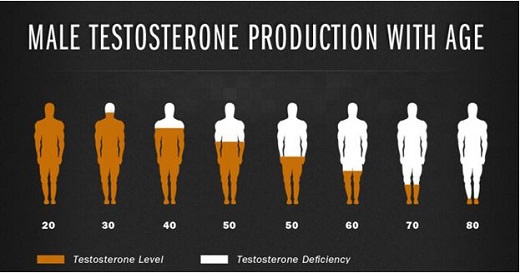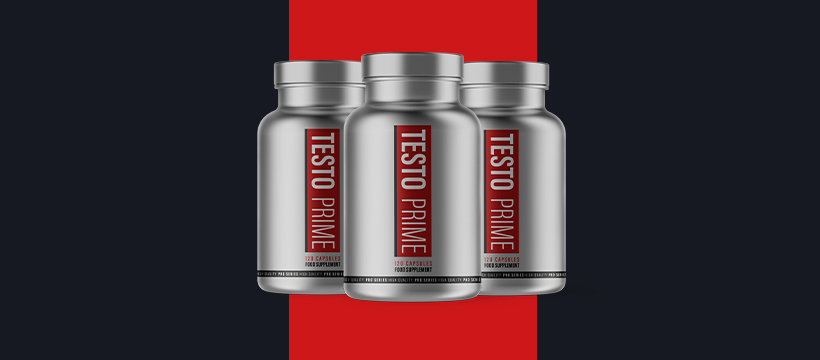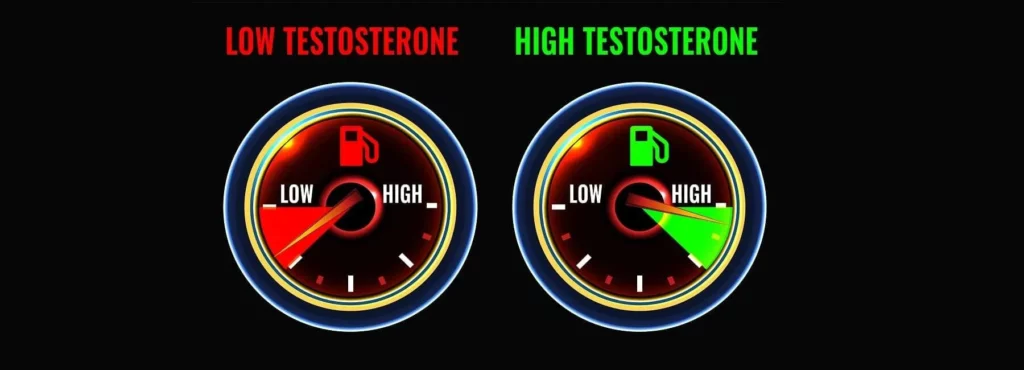Understanding testosterone is vital if you want to optimize your health and sex drive as a man. As you’ve probably guessed, testosterone plays a major role in men’s health.
But did you know testosterone also affects men’s mental health? Low testosterone levels can cause low libido, depression, mood swings, weight gain, muscle loss and fatigue. If you’re experiencing any of these symptoms or simply want to understand more about testosterone and men’s health, we’ve got you covered. This blog will cover all the basics of testosterone, its role in men’s puberty and sexual drive.

What is Testosterone?
Testosterone is an androgen hormone primarily produced in the testicles of men and in smaller amounts in women’s ovaries. It plays a vital role in sperm production, bone density, muscle strength, red blood cell production, sex drive, and other functions in both male and female bodies.
Too much testosterone in males can cause male pattern baldness and infertility. Excess testosterone in females can lead to the development of male characteristics such as facial hair growth and sperm deficiency. Testosterone is regulated by the brain and pituitary gland, and its level is controlled by several factors including age, sex, and genetics.
In a healthy body, testosterone levels are low during childhood and adolescence but gradually rise until they peak at age 30 or 40 and then begin to decline with age.
How Does Testosterone Affect Men’s Health?
Testosterone plays a crucial role in men’s health beyond sexual and physical development. It affects many aspects of men’s overall health, including sexual health, muscle mass, bone density, cardiovascular health, mood, cognitive function, and sleep. Low testosterone levels can lead to a range of health problems, and testosterone supplementation has been found to be beneficial in improving many of these health issues. However, testosterone supplementation should only be used under the guidance of a healthcare professional, as it may have adverse effects when used improperly.
Testosterone and Sexual Health:
Testosterone is crucial for the development and maintenance of healthy sexual function in men. It plays a critical role in the formation of sperm, and low testosterone levels can lead to a decrease in sperm production, which can result in infertility. Testosterone also affects sex drive or libido. Low testosterone levels can lead to a decrease in sex drive and other sexual problems such as erectile dysfunction, decreased sexual satisfaction, and reduced ability to maintain an erection.
Testosterone and Muscle Mass:
Testosterone is responsible for building muscle mass and strength in men. When testosterone levels are high, they promote protein synthesis in the body, which results in the growth and maintenance of muscle tissue. Testosterone also plays a role in reducing body fat by regulating insulin sensitivity, allowing the body to use insulin effectively to convert glucose into energy, and preventing the storage of fat.
Testosterone and Bone Density:
Testosterone plays a significant role in the maintenance of bone density in men. As men age, their bones become weaker and more prone to fractures due to the natural process of bone loss called osteoporosis. Testosterone helps to prevent osteoporosis by stimulating bone formation and inhibiting bone resorption, reducing the risk of fractures.
Testosterone and Cardiovascular Health:
Testosterone also affects cardiovascular health in men. Low levels of testosterone have been linked to an increased risk of cardiovascular disease, including coronary artery disease, heart attack, and stroke. Testosterone promotes the production of red blood cells, which carry oxygen to the body’s tissues, including the heart. It also helps to improve cholesterol levels by reducing the “bad” LDL cholesterol and increasing the “good” HDL cholesterol levels.
Testosterone and Mood:
Testosterone plays a role in regulating mood and emotional well-being in men. Low testosterone levels have been linked to depression, anxiety, and irritability. Testosterone supplementation has been found to improve mood, reduce anxiety, and increase feelings of well-being.
Testosterone and Cognitive Function:
Testosterone also affects cognitive function in men. Testosterone levels decline naturally as men age, and this decline has been linked to cognitive decline and an increased risk of dementia. Testosterone supplementation has been found to improve spatial memory, verbal memory, and executive function.
Testosterone and Sleep:
Testosterone affects sleep patterns in men. Low levels of testosterone have been linked to sleep disturbances, including insomnia and sleep apnea. Testosterone supplementation has been found to improve sleep quality, reduce nighttime awakenings, and increase the overall duration of sleep.
Role of the Testosterone in Male Puberty
Testosterone has several important effects on the body during puberty. One of its primary functions is to stimulate the growth and development of the male reproductive system. Testosterone promotes the growth of the testes, the prostate gland, and the seminal vesicles, which are responsible for producing semen.
In addition to its effects on the reproductive system, testosterone also has anabolic effects on the body. It promotes the growth of muscle mass, bone density, and red blood cell production, which is why it is often used as a performance-enhancing drug by athletes. Testosterone also plays a role in the distribution of body fat, helping to create a leaner, more muscular physique.

During puberty, testosterone also plays a role in the development of secondary sexual characteristics. These are physical characteristics that distinguish males from females and include the growth of facial and body hair, a deepening of the voice, and an increase in sweat production. Testosterone also promotes the growth of the Adam’s apple, which is a prominent feature of the male neck.
As testosterone levels rise during puberty, boys may experience changes in mood and behavior. They may become more aggressive or competitive, and they may be more likely to engage in risk-taking behaviors. Testosterone has also been linked to an increased libido, or sex drive, in both males and females.
Testosterone levels can vary widely among individuals, and some boys may experience delayed or early puberty due to hormonal imbalances. Boys who have low levels of testosterone may experience delayed growth and development of the reproductive system, as well as a lack of muscle mass and bone density. In some cases, testosterone replacement therapy may be used to help these boys reach puberty and develop normally.
Let’s Sum Up
The production of testosterone in men starts to reduce after the age of 30. This leads to aging and a host of other health concerns. If testosterone levels are low, it can lead to low libido, low sperm count, low muscle mass, and even erectile dysfunction. Hence, testosterone replacement therapy is one of the best solutions for improving sexual function and increasing muscle mass.






